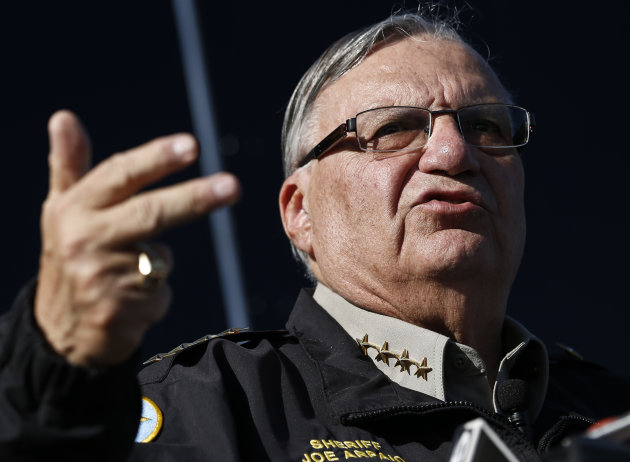
By
PHOENIX (AP) — A campaign to force a recall election against the polarizing sheriff of metropolitan Phoenix has failed.
Recall organizers said Thursday that they couldn't collect enough voter signatures to bring Maricopa County Sheriff Joe Arpaio to the ballot again.Organizers of the recall effort needed to turn in more than 335,000 valid voter signatures by 5 p.m. Thursday to force a recall election.
"It is a sad day," recall campaign manager Lilia Alvarez said. "It is a disappointment."
Recall organizers won't reveal the number of signatures they gathered. In their last update, given five weeks ago, organizers said they had gathered 200,000 signatures.
"The count at this point doesn't matter," Alvarez said in deciding not to reveal the number of signatures gathered.
Arpaio issued a statement suggesting that recall organizers aren't revealing the number of signatures they gathered because they are embarrassed by the level of their failure. "This effort failed because the good people of Maricopa County, whom I'm honored to serve, rejected the wrong-headed idea of overturning an election," Arpaio said.
Arpaio supporters say the sheriff won re-election in November fair and square and that recall organizers shouldn't have been allowed to contest the election simply because they didn't like the outcome.
The recall effort began just weeks after the 80-year-old Republican sheriff started his sixth term in January. His November re-election race marked the second closest contest in his 20-year political career. He beat the closest candidate by 6 percentage points.
Joshua Spivak, a recall expert
and senior fellow at Wagner College in New York, said the Arpaio recall
effort suffered from too little fundraising, having to collect an
unusually high number of voter signatures for a county race and not
having an alternative candidate lined up to run against Arpaio. "They
are running against Joe Arpaio," Spivak said. "But who are they electing?"
Recall organizers had hoped that last week's racial profiling ruling would pump new life into their cause. Supporters were camped outside a county building for more than four days in their final push.
"I wish from the bottom of my heart that this ruling would have come out a month earlier. Had this ruling come out a month earlier, who knows how many signatures we would have gotten," Democratic state Rep. Martin Quezada of Avondale, a supporter of the Arpaio recall effort, said.
In the hours before the recall petitions were due, a trickle of people dropped by three tents set up by recall organizers outside the county building to sign petitions. Clipboard-wielding volunteers hit up people walking on the sidewalk for signatures and wore T-shirts that said, "Petition Posse," a play on Arpaio's posses whose volunteer members assist sheriff's deputies in some of their duties.
In the past, the sheriff has apologized for the bungled sex-crimes investigations and said his office has moved to clear up the cases and taken steps to prevent a repeat of the problem. He also has vigorously denied allegations that his deputies racially profiled people in traffic patrols targeting immigrants who aren't authorized to be in the country.
Recall organizers were trying to build on the success of a 2011 recall effort that ousted then-Arizona Senate President Russell Pearce, an Arpaio ally who was the driving force behind the state's contentious 2010 immigration law. But the scale of the Arpaio recall was more daunting.
Only 7,700 valid signatures were needed to trigger the Pearce recall election.
No comments:
Post a Comment